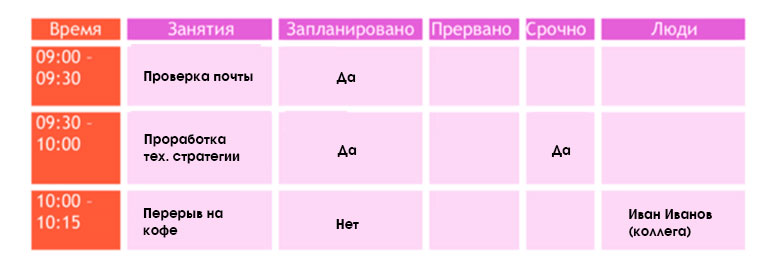How I pumped the skills of personal effectiveness

Work 24 on 7
“Hello everyone, my name is Anton, and I am a workaholic. I often work 12 hours a day. My family is suffering a lot from this. I really want to start living like all normal people, but every time I break down and sit up after midnight ... ”- probably I would start my speech if I were in a club of anonymous workaholics.
Yes, I really really love my work and spend almost all my time on it. I work as a technical director in an IT company, I really like the process of work, and even more when I get some visible results.
I was lucky with my other half, my wife supports me and endures me. Others in her place would most likely be rolling tantrums. Natasha spent all day alone with her children at home, leading to mugs and a preparatory class senior. We almost never had a full vacation. On weekends, I also often worked, came home late and took work home.
“All of me is gone, I work,” I told mine and sat down at my laptop. But the problem is that you can’t explain it to the children, they pull you by the hand, call you to play, get upset and cry when you refuse them. It starts to annoy you, because you need to concentrate. Then you pull yourself together and do a favor to your child, such as: “Well, let’s quickly collect your railway,” and at the slightest opportunity try to get back to your work. That is, it turns out, distracted the child, and while he sits quietly, running around to do business.
Like most people, I tried to solve pressing problems and tasks that seemed important to me. I thought that I need to do them right now, and everything else will wait. I’ll rest in retirement, the child will cry and stop. “Wife, what do you want from me ?! You see, I constantly work and get very tired. ”
The worst thing is that such a life turns into a routine when you have work - home, home - work. A person falls into stagnation, and then can go to the stage of degradation. And it is inevitable, as the whole world is changing, and you are standing still.

Probably you know? When friends or parents call you and ask: “How are you?”, And you answer: “Yes, everything is fine, work is home, house is work, in general everything is like everyone else!” And in the evenings you are lying in bed, watching Instagram and quietly envy those heroes who enjoy every day, travel with their families, perform somewhere, play sports, write books. Where do they get so much time? Do they have 24 hours a day?
What to do and who is to blame?
Relatively recently, I looked at myself from the side, from a different angle. I realized that I'm not quite a workaholic, I'm a procrastinator. And I’m sure that most of the so-called workaholics are procrastinators.

Often procrastinators are compared with lazy people, but this is not so, although laziness is one of the causes of procrastination. For days I’m not lying at home on the couch, I just don’t know how to properly manage my time, and I constantly postpone important things for later, tomorrow.
If you look back, then the skills of procrastinator I pumped most of all at the institute, in the hostel. I think this is familiar to many, you prepare for exams on the last night, and for the diploma last week. Although I knew such people who were well done, and prepared for everything as planned. Always envied such people, but at the same time he did nothing to change.

Instead of taking and doing, for example, dividing the preparation for the exam into small tasks and teaching in small portions, you look at it as one big task and you can even start teaching, but you understand that you learn a lot and you won’t have time already today. It’s better to start early tomorrow and do something more useful today (actually more interesting to you) - for example, learn how to retouch in Photoshop or play a new toy. And so, day after day ... Then, when you pass the point of no return, the point after which you can’t change anything, you start trying your best to do at least something. For example, you sit all night and learn these unfortunate tickets, and at 4 or 5 in the morning you realize that you won’t have time and start making spurs. In the morning you go to the exam like a zombie who hasn’t slept enough, there’s nothing in his head.

For 5 years, you get used to it and it becomes the norm, and then the “adult life” begins and you continue to carry out all other things in your life along the track.
Then you look back, and you are already 30, and maybe already more ... and you are lucky if you have not yet passed the point of no return and there is still a chance to change everything, or at least make your life better.
This is the bitter truth: when you do the routine, you don’t have time to look around, analyze, think. You do a similar job every day and you don’t see that the world has already changed, and perhaps you don’t need to do it anymore, you need to change the scope of activity or carry out modernization. Through this prism, you can look at absolutely all the affairs of your life. Try it, look around, think, maybe you can change something now.
Perhaps some of you already thought at some point: “Damn, you have to change!”, For example, “I'm fat, I need to start going to the rocking chair” - but since we are procrastinators, we are all important and big things, and especially if they cannot be measured, we postpone it for later. Therefore, we say to ourselves: “Everything, from the beginning of next month I will definitely start”, a new month comes, and we already have a new excuse.
Personally, I can’t say about myself that I am an effective and virtuoso time manager. But one thing is for sure, I became more effective than I was six months ago, and even more effective than a year ago.
You need to understand that the process of becoming effective is a certain function in time, and not some stage, after which you say: “I have become effective!” This is a very difficult way and constant work on yourself.
In order to start changing yourself, you need knowledge and the development of minimal skills. You can, of course, work on yourself like blind kittens who know the world around us, and bump your nose about all the obstacles. And you can use the knowledge that humanity has accumulated and try to find and identify the necessary tools that will help in this difficult path.
In general, I believe that knowledge on time management, on the prioritization of tasks, on planning should be given at the institute without fail, and the foundation should be laid back at school.
Not reinventing the wheel
When I thought about my behavior, where to start, I read David Allen’s Getting things Done. The main idea of the GTD method, which he was trying to convey, is to save your mind from remembering current tasks, you need to write everything down, not remember it.
GTD method
According to this method, it is better to break the received information into several stages of processing:
- Collection
- Treatment
- Organization
- Overview
- Actions
Collection
Any incoming task or idea needs to be fixed on any medium, since today we have a bunch of tools for this. I tried different: reminders on iOS, ToDoist, Trello, physical diary. I think you can’t recommend a specific tool for everyone here, there is no silver bullet, for me Trello and the calendar were the best places to visit me.
Processing
Processing of the collected information should go according to a certain algorithm:
- Take the top element
- If it requires actions that take a little time (up to 5 minutes), then we immediately do this task or delegate it, or postpone it if the task requires more time
- If the element does not require action, then we leave it somewhere as reference information, or generally discard it, or transfer it to the list someday / maybe
Organization
At this stage to work on tasks that require further action. David Allen suggests splitting tasks into several lists:
- The following actions
- Projects
- Deferred
- Someday / maybe
This method didn’t suit me fully, since I had other problems: I did not know how to set goals, manage time correctly and delegate.
That is, the list of tasks for me was still routine, and often I did not even understand what I should do after I finished the tasks. I was just trying to come up with myself more tasks, and then more.
Doctor, what's wrong with me?
I realized that I was doing something wrong, it wasn’t getting better, everything was the same, only now I was still thinking up and writing down tasks. I tried to find other, more effective options. And ... one day I realized I had to keep track of time. The problem is that since I am a procrastinator, I need to get the data where I spend my time.
I read about a technique such as timekeeping from Alexander Lyubishchev, but was blown away after a week. I simply physically could not force myself to do all this, since the system is intended for a certain type of personality: pragmatic, focused, ordered - this is definitely not about me.
The main principle of the technique is to develop a sense of time and feel uncomfortable when time is not spent efficiently. The first step was to simply time all the actions for more than six weeks, taking nothing to change their habits associated with using time. In other words, everything that happens needs to be recorded in the so-called time register.

In theory, every day the sense of time should be strengthened and you can learn to distinguish between the so-called "slow" and "fast" time, and eventually begin to understand when time is "accelerating", learn to slow it down and be as long as possible in the "slow" state time ”and do more tasks. In the end, it becomes quite real to live 2-3 “ordinary” days daily, as Lyubishchev himself did.
It seems fantastic, but a very real technique. If you want, try it, maybe it will work for someone! Then I read about the 10 golden rules of Lothar Sievert. Some of them have real benefits, I try to apply them in my life.
Intentionally retire and set an unacceptable watch. This rule works well when performing very important tasks.
Whenever possible, do only really important things. There is such a Pareto principle, which states that only 20% of cases are of key importance.
Perform large tasks in small parts.
Set yourself deadlines and priorities.
It seems everything is logical and understandable, but in practice it is very difficult, you constantly break down and begin to procrastinate. Things did not get smaller: I also continued to linger and take work home.

Again, I'm doing something wrong!
Eureka!
Then I realized that you cannot do a task for the sake of a task, but you need to learn how to set goals. It also seems to be trivial, but in practice I realized that I can’t set goals. And I began to figure out how to do it. There’s a whole slew of methods, I won’t talk about everything, but I’ll tell about those that came up to me.
Most of all I liked the principle of goal setting by the SMART method. I think many have heard of him. It consists in the fact that the goal should be:
Specific,
Measurable,
Achievable
, Necessary, reasonable (Realistic)
Clearly defined in time (Timed)
After that, I came to understand how now I need to complete tasks, how to plan. Knowing the goal, you can always make a decomposition and understand how to achieve it, what actions need to be taken. From this point you begin to come up with tasks.
It became easier, but there were still many tasks, and the most difficult thing is that you do not always understand when and what task should be done, and when not. For example, you are doing some important task, and then someone abruptly comes up with their problem, and it seems to be an important task too. You decide to help and switch, as a result, you do not do your task, but you performed a completely different one that you did not plan and which in the end turned out to be optional.
And then I came across two methods that I think most influenced me. The first is the Eisenhower priority matrix.

When you take a task, you first run through this matrix and understand whether it is worth doing or not.
It got better, I started running all incoming tasks through this matrix and really began to realize that most of them can be either postponed or delegated, but one question remained open.
My children need attention, my wife needs help. To me myself - time for playing sports, reading, relaxing ... but time, despite the obvious changes, this was still not enough.
Total planning
And one day I came across an article that was a discovery for me, and later I read other sources on this topic. The article was about unconventional methods of modern time management based on the principles of Stephen Covey. It turns out that you can plan not only work! :) Stephen Covey invented the principle of a balance between results, resources and means of achieving them and proposed 6 rules.
Balance - a harmonious distribution of time to achieve important goals in various spheres of life.
Concentration is the most time spent on “important and non-urgent” things, as they provide the most benefits. And he advises to plan not daily, but weekly, as it allows you to reserve large periods of time for important, but not urgent matters.
Flexibility- plans should be convenient for you, in accordance with your habits, style of work. If necessary, you can easily change the plan without becoming dependent on a previously drawn up plan.
Humanity - in relations with other people, traditional time management for accuracy in the schedule and subordination. Efficiency is much more important than ritual practice. For example: if your communication with a person is beyond the scope of the plan, but at the same time helps to establish a deep and full-fledged relationship, you should not feel guilty.
Coherence is the unity between vision and mission, roles and goals, priorities and plans, desires and discipline.
Compactness - tools should be as compact and convenient as possible. Summing up, first of all, you need to understand that time management is not just a technical skill, it is based on the ability to recognize one's own values (work, family, health), set goals and set priorities.
A few words about time sinks
Doing Unnecessary Things
The Eisenhower Matrix helps you.
Fulfillment of other people's duties
Performing something that someone else is obliged to do is sometimes very exciting. Especially when you are professionally strong in this matter.
Waste of time.
You spend more time on work than necessary. Not organized, consider the task difficult. There is simply no information, you begin to act quickly and without thinking. Trying to do it all yourself.
Wasting someone else’s time
- We give out useful thoughts to “catch up” when a person has already done most of the work
- We forget to share new information, artists work with outdated data
- Please help with something, but do not provide enough information.
- We allow ourselves lyrical digressions, because of which the discussions become excessively long
- Making punctual people wait late for a meeting
What is the result?
I’m still procrastinating, but thanks to these techniques and constant work on myself, I do it much less, I have more time. There is another secret: I found myself a friend, a colleague with whom we conduct business together and do not allow each other to engage in garbage. At home, I connected my beloved wife by the same principle, although she does it much worse and sometimes I freebie in household chores. I started playing sports, again a life hack - together with a colleague I chose a convenient time for this, and together we go to the gym and at the same time hold brainstorms. Then we come to the office and are engaged in the implementation of ideas or a necessary routine.
Yes, sometimes I modify the things I have started, such as writing this article, but much, much less. I clearly try to separate the house and work, although being a co-founder of my own favorite business, it is simply impossible, since work is also my home.
I plan to improve the acquired skills in time management, try new techniques or other combinations, invent life hacks. As I said above, this is an endless process of working on yourself, as soon as you stop, then quickly slide back into stagnation and degradation.
My goal is to learn how to manage my tasks in such a way that I have enough time to calmly engage in new ideas and directions, as well as to fully relax with my family twice a year.
